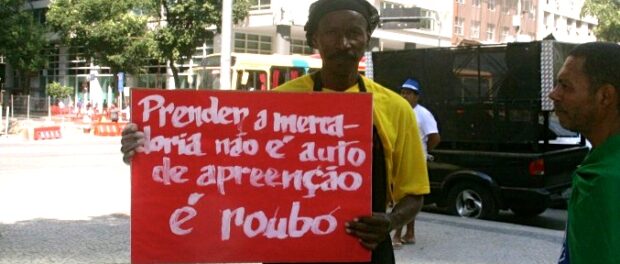
Last Thursday, August 24, a rally organized by the United Movement of Street Vendors (MUCA) was held in the center of Rio to protest against systematic State violence against street vendors. The rally comes barely one week after the intensification of clashes between the Municipal Guard and informal workers, which are particularly common surrounding Rio’s Central Station (Central do Brasil). Violence peaked on August 18, when the Municipal Guard attacked street vendors with pepper spray and rubber bullets, while vendors threw stones and attempted to resist the confiscation of their goods.
Being a camelô–what Brazilians call street vendors–is one of the only professional options for a large portion of Rio’s socio-economically disadvantaged population. According to data released by the municipality in 2009, 35,000 camelôs were registered, but only 18,440 licenses had been issued. Due to the informal nature of the profession, the real number of camelôs is likely much higher.
The recent trend of mega sporting events held in countries with high rates of informal employment (such as the 2010 World Cup in South Africa), has drawn more attention to the impact of such events on street vendors. Currently, the 2016 Olympic Games are being used as a contextual and discursive tool to frame a long-running struggle between vendors and the city. Speakers at last week’s rally view the current “city project” being implemented by Mayor Eduardo Paes as an attack on the rights and livelihoods of the poor. According to MUCA coordinator Maria de Lourdes, the model represents a broad consensus among different political parties and factions: “Nothing ever changes, or only the party changes, but the repression is still the same.”
Vendors suspect that the fire which burned the informal market space–the camelódromo–next to Central do Brasil to the ground in 2010 was a premeditated arson intended to facilitate the remodeling of the area. The fire led to the removal of street vendors who sold at the market, clearing the space for the construction of the Providência cable car as part of the Porto Maravilha regeneration project. Camelôs have also been forced out of Praça Mauá, a main square in the port area which has been completely redeveloped and is now home to the Rio Museum of Art.
Under the slogan of “street vendors are not thieves, street vendors are workers,” protesters put forward their demands: an end to the violence against informal traders by security forces and the militarization of the city; an end to the confiscation of street vendors’ belongings; and the legalization and issuing of trading licenses for informal workers. MUCA activists were supported by other marginalized groups, such as members of the Aldeia Maracanã urban indigenous village next to the Maracanã Stadium which has sustained a lengthy resistance campaign. Marco, an indigenous activist, made an emotional speech during the rally: “What is happening here is a rally organized by workers, honest people who earn their bread day to day.” United with the camelôs, indigenous activists also view the current transformation of Rio as exclusionary, following a global-city project in which minorities and low-income citizens are marginalized.
Organizing on behalf of street vendors since 2003, MUCA declared its commitment to challenging the ongoing repression of camelôs. However the nature of the profession makes organizing difficult: street vendors are individual traders who work day-to-day making it hard to mobilize workers and supporters to attend rallies. But demonstrators in attendence last week expressed hope for political change. As Raimonte, a MUCA activist, observed: “The Olympic Games are next year, but so are the municipal elections.”


